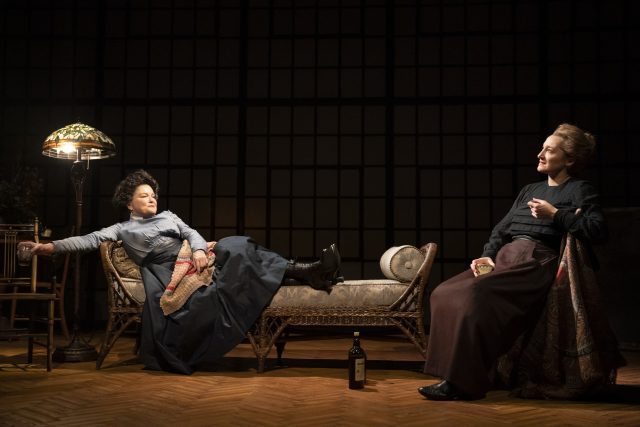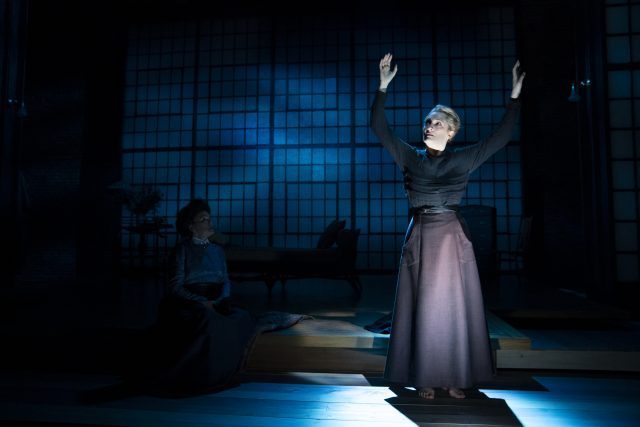
Hertha Ayrton (Kate Mulgrew) and Marie Curie (Francesca Faridany) try to get away from the maelstrom in new Audible play at the Minetta Lane (photo by Joan Marcus)
Minetta Lane Theatre
18 Minetta Lane between Sixth Ave. and Macdougal St.
Tuesday – Saturday through December 22, $77-$87
thehalflifeofmariecurie.com
In 1911, Nobel Prize-winning scientist Marie Curie was in the midst of a scandal. Despite all her accomplishments, she was being chastised by the press, the public, and her colleagues for being a “homewrecking harlot” because she was having an affair with married French physicist Paul Langevin. Her good friend Hertha Ayrton, an award-winning electromechanical engineer and fierce suffragist, came to her rescue, whisking her off to Ayrton’s beachfront house in Highcliffe-on-Sea in England where Curie could recollect herself and get away from the nasty maelstrom. That true story is told in Lauren Gunderson’s cogent and compelling two-woman play, The Half-Life of Marie Curie, which opened Tuesday night at the Minetta Lane. Commissioned by Audible, which will release the audio version on December 5, the show features Kate Mulgrew as the staunch Ayrton, born Phoebe Sarah Marks in Hampshire in 1854, and Francesca Faridany as the doubting and uneasy Curie, born Marie Skłodowska in Poland in 1867.
“You’re nothing but a pack of wolves. Do you know whose house this is? Do you have any idea who this great woman is?” Ayrton yells at a rabble outside Curie’s home in Sceaux, France, following two monologues that introduce the characters. “While you’re running as a herd of teethy rats, she’s changing the goddamn world. Also there are children in this house and if you frighten them any more than you already have I swear to a god I don’t believe in that I’ll come to each one of your houses and SHAKE THEIR FOUNDATIONS.” Curie, who believes her career is over, has practically locked herself inside, unable to face the uproar. “Don’t you see the severity of this,” she tells Ayrton. “This country hates me, they’ll take my funding, they’ll take my students, the Radium Institute will vanish, the Academy will never let me in.” Ayrton quickly responds, “Yes, but the Academy is full of men who were never going to let you in anyway.”

Marie Curie (Francesca Faridany) glows in the dark as Hertha Ayrton (Kate Mulgrew) watches in The Half-Life of Marie Curie (photo by Joan Marcus)
Once at Highcliffe-on-Sea, the two brilliant women, both widows with children, discuss love and sex, happiness, the male-dominated scientific community, nature, the secrets of the universe, the supportive Albert Einstein, poet Algernon Swinburne, and Curie’s constant pain, which concerns Ayrton. “I just need to be still for a moment. It passes. I don’t know what triggers it but it passes,” Curie explains. “Well, that’s a very general analysis for the foremost scientist in Europe,” Ayrton says. Curie: “Stress doesn’t help. That I know.” Ayrton: “Ah. Well. That’s what this summer is entirely about. Rest, my friend. You’re safe here. You’re free.” But Curie is having a difficult time with it all. “There is no wonder left in me, there’s nothing, I feel nothing because they’ve stripped me of myself to the point that I do not know who I am. I don’t know. I don’t know,” she says. She also doesn’t know that the vial of Radium she wears around her neck is not helping her ill health.
Obie winner and Emmy nominee Mulgrew (Tea at Five, Orange Is the New Black) and Faridany (Manifest, The Curious Incident of the Dog in the Night-Time) have a terrific, dare I say, chemistry, the former playing Ayrton with a bold determination and a wry sense of humor, the latter portraying Curie with a soft vulnerability and a surprising frailty. Ayrton, in a splendid high-necked dress by costumer Emilio Sosa, is just the friend Curie — or anyone — would be lucky to have. Riccardo Hernandez’s comfortable set, consisting of an elegant couch with chairs and small tables, doesn’t change between the two locations, lending a familiarity to the proceedings, while Lap Chi Chu’s lighting is particularly effective when the women deliver brief soliloquies. Meanwhile, Elisheba Ittoop’s sound design is highlighted by the offstage ticking of a Geiger counter, warning us of the true import of Curie’s discovery. Director Gaye Taylor Upchurch (The Year of Magical Thinking, Animal) and writer Gunderson (I and You, The Book of Will), one of the most-produced playwrights of the decade, won’t allow the show to slip into melodrama, instead focusing on Ayrton’s resolute bravado to lift Curie from her doldrums, then adding a brief coda that wraps it all up with a bittersweet touch.